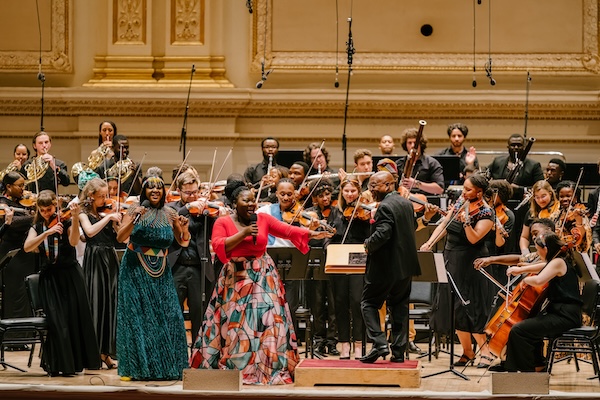Africa United brings, passion, purpose and wow to WOW!

Three nights in and the World Orchestra Week (WOW!) festival of youth orchestras at Carnegie Hall is already on the verge of being the classical event of the year. These international groups have brought fine programming, huge amounts of talent, and a very special kind of passion to these concerts.
Those qualities are what any classical music lover hopes for at every performance, but the passion, especially, has been an exceptional part of the experiences. The odds are against all of these young musicians having professional careers, and orchestras like the New York Philharmonic possess a level of refined technical skill that is far above these youth ensembles. But the point of making music is, well, to make music, to play the notes not as exercises but because they’re supposed to mean something.
And that’s what the Africa United Youth Orchestra (conducted by William Eddins) did Saturday night, with a beautiful and moving concert of music from three African composers alongside Dvořák’s Symphony No. 9, “From the New World.”
But first, a word on the ceremony. Classical music has developed a ritual of concert behavior centered around how musicians present themselves stage and when and how audiences applaud. This places a gap between performers and listeners that is not always bridged by the concert.
WOW! concerts begin with the musicians reaching the stage by coming down the aisles, waving to the audience, and before the playing starts they greet the audience from the stage and shout out to the other youth orchestras in attendance. The feeling for everyone is there; as concertmaster Gilah Kellner said from the stage, “We create unity through diversity, which is powerful and must be protected.”
The music making was wonderful. Yes, these are youth orchestras and have some limitations. For the Africa United, it was occasionally iffy ensemble playing, especially in the horns; smeared intonations and mis-coordinations.
These were prevalent in the opening Fatśe La Hero (My Country), by 20th century South African composer Michael Mosoeu Moerane. Although not a strong piece—it is an awkwardly written mix of lyrical pictorialism and post-Stravinsky rhythms—the sincerity and aesthetic nationalism was a fitting prelude to the evening as a whole and the Dvořák finale.
A boost came from excellent sopranos Goitsemang Lehobye and Masabane Cecilia Rangwanasha, who were up front for the final three works of the first half: “Nandi’s Love Song” from uShaka KaSenzangakhona and “Sengiyeza” from Princess Magogo, both by Mzilikazi Khumalo; and Bongani Ndodana-Breen’s “Die kind,” from Three Orchestral Songs on Poems of Ingrid Jonker.
These were terrific settings, sensitive to the original texts, clear in each composer’s intentions for emphasis and drama, and full of finely crafted instrumental details. The singing was superb. Even without the larger contexts from Khumalo, Lehobye and Rangwanasha had such fine phrasing and articulation that a strong sense of meaning came through.
Both sopranos showed beautiful instruments, Lehobye’s rounded and with a feeling of ornamentation in each note, Rangwanasha’s with a slightly lighter texture and a compelling firm line. Rangwanasha sang Ndodana-Breen’s setting of Jonker’s wrenching, humanist poem with a charisma that balanced sorrow and furious purpose.
Both singers came out for a first half encore, grabbing microphones and leading the orchestra in a scintillating arrangement of a throwback, quasi-traditional pop song with hints of the well-known “Mbube” (a/k/a “Wimoweh”), the singers dancing and ululating, the instruments following along, even the cellists standing up and swaying while playing.
After intermission, the “New World” symphony performance was something any professional orchestra would envy. For this, Africa United was augmented with musicians from the National Youth Orchestra of the United States of America (which plays Monday night). Again, there were some glitches in the brass and moments of muddled playing in the strings and woodwinds, but those were irrelevant against the beautiful, powerful music making.
Eddins was a superb leader all night, his beat and rhythms clear and without fuss, and, glowing with a great sense of encouragement and expression, seeming to enjoy himself as much as the musicians. One could not imagine a finer match between a conductor and youth orchestra—for the concert encore, he stepped offstage and let the musicians themselves reprise the music from the first half encore, playing by themselves and for each other and the audience.
Eddins pressed the tempo forward in the Allegro of the Dvořák first movement, then held it back in the Largo, and both were perfect choices for the passion and energy of the musicians in the first movement and the almost unreal delicacy of deep feeling in the second.
The tricky scherzo was agile and exciting, the finale stunning. What came out of the performance was an enormous sense of purpose, poise, and profound levels of meaning. Here was an orchestra of young musicians from Africa, playing Dvořák’s Ninth in Carnegie Hall where it first premiered, a masterpiece from a composer who had come to America and recognized a musical culture here that the classical music establishment was ignoring. These young visitors came to show the powerful unity through diversity in America.
WOW! continues with the Beijing Youth Orchestra, pipa player Wu Man and conductor Lü Jia 4 p.m. Sunday. carnegiehall.org
Posted Aug 05, 2024 at 2:45 am by Careena Bernstein
How fabulous our young musicians from Africa and America are. Bravo! And the super talented Goitsemang and Cecelia who I have followed for years and have met personally are the cherry on top.
My passion for music is thrilled by all these magnificent performers ♥️♥️